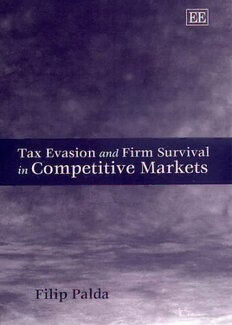
Tax Evasion and Firm Survival in Competitive Markets PDF
145 Pages·2001·1.319 MB·English
Most books are stored in the elastic cloud where traffic is expensive. For this reason, we have a limit on daily download.
Preview Tax Evasion and Firm Survival in Competitive Markets
Description:
Measuring tax evasion and the size of the underground economy is a growing industry among researchers. However, Filip Palda argues that deadweight losses from tax evasion are a social loss that have been largely neglected. Tax Evasion and Firm Survival in Competitive Markets illustrates how a firm with high production costs but which is easily able to evade taxes may displace from the market a company with low production costs but poor tax evasion capabilities. The difference in production costs between the inefficient survivor and the efficient loser is termed by the author as the 'displacement loss from taxation', and rivals in size the Harberger triangle loss from taxation. The book demonstrates how Palda's calculus for measuring displacement loss can be extended to subsidies, minimum wages, and any other government attempt to displace resources from one part of the economy to another. Throughout, the book highlights the way in which taxation has evolved to mitigate displacement losses and how policymakers should be even more sensitive to the larger costs of the uneven enforcement of taxes and regulations. This volume also contains simple but powerful analytical tools for calculating economic equilibrium in the presence of two inseparable characteristics of the firm that determine its survival in the market: the ability to produce efficiently and the ability to evade taxes and ignore regulations. This highly innovative book will be of great interest to public finance economists and policymakers concerned with fiscal issues.
See more
The list of books you might like
Most books are stored in the elastic cloud where traffic is expensive. For this reason, we have a limit on daily download.
